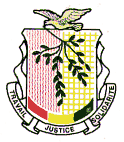 DEMOCRACY DEMOCRACY

 FROM DICTATORHIP TO DEMOCRACY FROM DICTATORHIP TO DEMOCRACY
For 26 years the country was closed to the world. It endured a brutal regime which only got worse when the Portuguese failed invasion of Guinea in 1970. Sekou Touré‚ became then suspicious of anyone, seeing plots everywhere, and did not hesitate to execute in public anybody who he considered a spy or who challenged his authority.
The situation got so oppressive that in 1977 market women, suffocated by agricultural taxes and police abuses, staged a revolt against the system which spread like fire throughout the country. This marked the inflexion point of Sekou Touré’s previous policy. After that small trade was allowed and shortly afterwards diplomatic relations were resumed with France and other African countries.
When Sekou Touré died of a heart attack in 1984 the military immediately took over and soon proclaimed the 2nd Republic. Colonel (today general) Lansana Conté‚ was appointed president and the PDG, the communist party of Guinea, was abolished, declaring Guinea a free society and liberalizing the economy.
 A PEACEFUL TRANSITION A PEACEFUL TRANSITION
The biggest success of president Lansana Conté‚ has been the peaceful transition between an autocratic communist regime and a free democratic society. Nevertheless building the country up from its ashes has not been an easy task.
|
When president Conté took office Guinea was lagging far behind according to the Human Development Index. Reforms have been carried out slowly and carefully. Under pressure from donor countries, multiparty elections finally took place in 1993. General Lansana Conté won presidential elections with a wide margin thus starting the 3rd Republic. Other democratic institutions followed: a unicameral Congress, a Supreme Court created following the US model, and an Economical and Social Council.
 TWO FAILED COUPS TWO FAILED COUPS
One of the first tasks Mr. Conté set himself to do was to reverse the state-controlled economy. He urged Guinean expatriates to return to the country and started economic reforms. Despite the changes introduced, General Conté had to face 2 failed coups. The first one took place in the early years of his mandate, forcing him to depose the prime minister and leader of the mutiny, thus eliminating the prime minister post until recently. In 1996 a group of officers, claiming that the military was underpaid, staged another revolt. This time the president personally took hold of the situation and, promising to increase the insurgents’ payrolls, was able to spare the country from another military regime.
This challenge to the president’s authority procured further changes in the way the country was ruled. The cabinet was replaced by technocrats whose mission was to shape up the key sectors of the economy, and the post of prime minister, still vacant, was filled by Mr. Sydia Touré‚.
 PRESIDENTIAL ELECTIONS IN THE 40TH ANNIVERSARY OF INDEPENDENCE PRESIDENTIAL ELECTIONS IN THE 40TH ANNIVERSARY OF INDEPENDENCE
Today, 40 years after its independence Guinea has still a long way to go. Since Presidency is held for a 5-year term, Mr. Conté‚ is confronted with new elections in December 1998, shortly after the 40th anniversary of independence (October 2nd 1998). The PUP (Parti de l’Unité et du Progrés) the presidential party, does not face serious opposition, thus assuring political stability for at least 5 more years. International observers are expected during the elections to insure total transparency of the voting process. |

